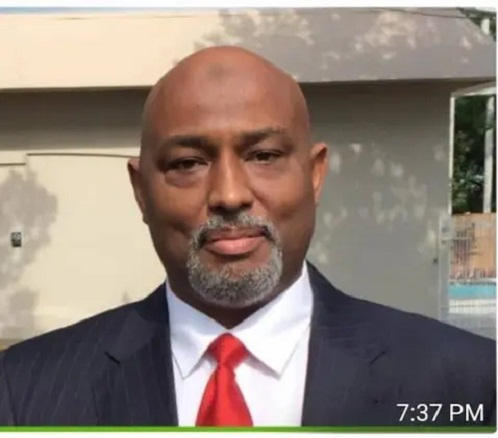Maritime
Nweke Canvasses Restructured Tax Break for Export

BY EGUONO ODJEGBA
A freight forwarder and maritime research fellow, Dr. Eugene Nweke has called on the Federal Government to undertake an urgent policy appraisal of the nation’s export sector, aimed at optimizing its potentials and capacity utilization, through emplacement of a structured tax break.
The former National President of the National Association of Government Approved Freight Forwarders (NAGAFF) in an open letter to the Minister of Finance, Hajia Zainab Ahmed, urged the federal government to review its excessive policy regime in the real sector, and appealed to her to go back to the drawing board and come up with an acceptable macroeconomic policy thrust that will grow the nation’s export base.
He also lamented the imposition of duty benchmarking on customs trade goods which he said is a deliberate tax on trade, in the guise of revenue generation without consideration for its attendant negative consequences on citizens’ purchasing power and standard of living, in addition to the ripple effects on the nation’s international trading image.
Nweke also urged the federal government to desist from engaging in unilateral decisions that affects the country’s import and export trade and learn to consult players and stakeholders before imposing policies, which he said are more often than not detrimental to economic activities and hurting the country’s trade balance.
The letter dated 25h April 2022 with the theme “Much Ado about the Finance Minister and the Board of Customs” also note that while the government is at liberty to continue to tax foreign investments and imports reasonably, he challenged the federal government to create an enabling environment through a well structured incentive climate that will aid local investments in high tech, manufacturing and export trade.
The letter reads: “Honorable Minister we the Freight Forwarding Practitioners wish to use this medium to call your attention to your stipulated responsibilities (duties) as provided under part 2, section 3 (Establishment, Constitution and Proceedings of the Board), section 4 ( Powers and Duties of the Board) and section 5 (Board to be Subject to General Control of the Minister) of the Customs and Excise Management Act. Cap C45.
“The power of the Board under your control cannot be over emphasized, and from indications fiscal policies in relation to trade and other administrative functions revolve primarily around decisions taken by the Board, such decisions influence other arms of fiscal policies formulation.
“However, our findings show that most of the recent trade fiscal policies taken do not clearly points to decisions taken at normal board meeting where the inputs of other related Board members were sought. From the Freight Forwarders stand point, until the Minister, the Customs and the Central Bank of Nigeria meets as often as possible for effective adherence to the Act, your efforts will not genuinely encourage trade taxation policies that will promote or allow organizations to invest in smaller portfolio and seek better returns outside the country.
“We support that foreign investment should be taxed by the government to encourage some local entrepreneurs to set up shops or cottages industries to tap into these funds, which are tax free for investments in Nigeria. There should also be more incentive to invest in high tech, manufacturing or exporting business.
He continued: “We are aware of countries where companies adheres to 90% government relaxing rule for investment in small entrepreneurs, on the basis of dollar-for-dollar; and for every dollar an investor puts into a local enterprise, they can invest a dollar offshore.
“This type of trade investment policy is desirous in our dear country, especially so, in the face of the African free Continental Trade Agreement (AfCTA) implementation regime.”
According to the erudite freight forwarder, Nigerian manufacturers and exporters are victims of oppressive tax regime; a development he explains has displaced Nigerians engaged in the ECOWAS Free Trade Liberalization Scheme programme into glorified errands boys for foreign players who have dominated the scheme.
“It is easy to argue that through the government so-called interventions, Nigeria Manufacturers and Exporters are not at any tax disadvantage compared to other developing nation’s manufacturers and exporters. But the reality is that, our Nigeria manufacturers, exporters and other entrepreneurs do not have advantages, despite tax regime waiver in place, but no enabling environment for its prompt utilization).
“They are limited by many contending factors of productivity and marketing. Nigeria has such unstable domestic and infirmly regulated economy that cannot act as springboard for low cost exports. The consequence being that, a subsidiary plant and products imports franchise economy under the regime of free trade liberalization scheme, merely consists of few foreign owned subsidiaries, making profitable amounts on many trading products above the citizens purchasing power average in the markets.”
Nweke notes that rather than emphasize ‘Product Import Franchise”- (PIF), government should support local manufacturers to drive a beneficial franchise based on World Product Mandate “(WPM) to grow their export potentials.

“One of the big expectations from the Freight Forwarders is for the NCS Board to appreciate that other than encouraging and emphasizing more of ‘Product Import Franchise”-(PIF), it should rather be at the forefront to foster and encourage Nigeria manufacturers and entrepreneurial plants to obtain “World Product Mandate “(WPM) from their parent companies, allowing them to specialize, lower their costs and export more goods.
“Our manufacturer and entrepreneurs requires a restructured huge tax breaks or even tax holidays, especially for those manufacturers and entrepreneurs who are export oriented. Tax breaks will give rise to criticism from other businesses sectors, such as service industries, but the good news is that, at large it will ultimately benefit many major multinationals and manufacturers to access the World Products Mandates as a viable alternatives.
“The desire and concern of the Board and its Chairman should not only be limited to revenue generation but on how to assist manufacturers to ensure that made in Nigeria products floods the international markets. This will in turn lead to more world products mandates, more exports, and more research and development here in Nigeria.”
“Such tax breaks would increase the depths of our already deficit ridden government, and they would be a bold industrial strategy that can contribute to building the nation’s wealth. In addition, it will add impetus to our active participation in the ongoing AfCTA implementation regime.”
He continues: “We say this in the context of the competitive edge of the manufacturers, exporters and freight forwarders in Nigeria. Past and present government has instituted one tax policy grants or rebates regime and other forms, but Freight Forwarders are mostly concerned with a structured and repackaged tax breaks that will encourage exploration or research and development.
“Presently some manufacturers and few exporters get some tax breaks in the form of fast write offs, slightly lower corporate taxes, even at that, one cannot readily state any known “no sales taxes on exports” policy, which Freight Forwarders will appreciate the more.”
He also proposed a great deal of supervisory role over CBN in respect of perceived and unwarranted interferences and policy high handedness.
“Honorable Minister, there is need for you to steer the NCS Board effectively and watch closely the activities of the Central Bank of Nigeria, especially on the aspects of conflicting monetary and fiscal policies applications. Most of this trade fiscal policies been churn out are more of imposition without the consent of the legislatures.
“It must be strongly emphasized that the international trading environments is highly volatile and fragile, our fiscal policies over the years has not achieved its desired objectives owing to applications and associated inconsistencies, more of changing the goal post when the match is on. We say this, because the nation’s balance of trade is still in deficit, even though other contributory factors are responsible, but an effective fiscal trade policy is the bedrock.
“Going forward, we urge you to lax the present policies and tax imposition, then please go back to the drawing board, review critical issues and concerns raised in this letter and elsewhere by stakeholders, and make adjustments for the sake of the impoverished consuming public.”
While arguing that oppressive fiscal and monetary policies have also crippled the nation’s FREE TRADE ZONES capacity, Nweke advocated a ‘lobbyists registry’, said to be tailored towards arresting mismanagement of public fund, as a suitable template to guide the 2023 elections.
“Our FREE TRADE ZONES capacity has been under utilized, reasons being lack of home tailored and real time tax breaks. The Freight Forwarders wish to encourage you to evolve a direct policy that would promote the official establishment of the lobbyists’ registry, stating clearly the applicable and acceptable guidelines governing lobbying activities in the country.
“The need to curb abuses in the form of lavishing public fund on lawmakers with gifts and other benefits including free flights with all expenses paid cannot be over emphasized. There is need to evolve a similar policy for ceiling and disclosure rules to govern political campaigns contributions.”
Still expressing concerns about the ethical renaissance of the upcoming election, Nweke added:
“Presently, the applicable rules are spotty and are not effective. As a matter of consideration, the new rules should promote the integrity of our electoral system. It is noteworthy to state that there is a common interplay between economic lobbyists and political gladiators in the context of trade investments and rebates.
“Or findings show that most of the contracts awarded in these circumstances are prone to this unhealthy interplay, which is not too good for a developing economy.”




























